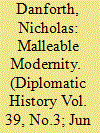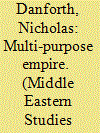|
|
|
Sort Order |
|
|
|
Items / Page
|
|
|
|
|
|
|
| Srl | Item |
| 1 |
ID:
139163


|
|
|
|
|
| Summary/Abstract |
Using US policy toward Turkey in the 1950s as a case study, this article argues that any discussion of the role of modernization discourse in US policy-making must begin by recognizing its malleability. Modernization as an ideology could, in the agile minds of American diplomats, serve to articulate and justify diverse, even contradictory policies. In the Turkish case policymakers invoked modernization to support, and oppose, democracy and dictatorship alike. Malleability also enabled modernization to simultaneously serve as policy and propaganda: At the same time the US government implemented programs that sought to modernize Turkey's military, economy, and even its population, the US Information Service, with the active cooperation of the Turkish government, quite consciously crafted propaganda to advertise America's modernity in order to win support for the US-Turkish alliance.
|
|
|
|
|
|
|
|
|
|
|
|
|
|
|
|
| 2 |
ID:
131463


|
|
|
|
|
| Publication |
2014.
|
| Summary/Abstract |
This article examines popular, academic and political perceptions of the Ottoman Empire in Republican Turkey, challenging the widespread assumption that there has been a continuous clash between pro-Ottoman Islamists and secular, anti-Ottoman, Kemalists. It argues that in the Republican period Kemalists effectively appropriated the Ottoman past for use in their nationalist narrative, not only through using a 'theory of fatal decline' but also by simply defining positive cultural or political symbols from the years 1299 to 1923 as 'Turkish' rather than 'Ottoman'. This serves as a backdrop for the article's main argument, that the 1940s and 1950s saw a thorough Kemalist appropriation of the Ottoman past, celebrating the empire's golden age as secular, pro-western and Turkish. The 500th anniversary of the conquest of Istanbul in 1953 gave the Turkish government an opportunity to showcase this new interpretation of Ottoman history as well as to use the relatively new rhetoric of 'Ottoman tolerance' to claim for Turkey a place among its new allies in the democratic, anti-communist West. At the level of domestic politics, the Democratic Party sought to wrap its modernization policies in the mantle of a progressive, democratic Fatih Sultan Mehmet II, while the Republican People's Party condemned the Democrats for betraying Fatih's memory and the nation's honour by downplaying the Ottoman past in order to placate potential anti-communist allies in Greece and the Arab world. Ultimately, the article argues that it is impossible to understand contemporary Islamist and liberal uses of the Ottoman past without understanding the way the empire was incorporated into the dominant Turkish nationalist narrative between 1923 and 1953
|
|
|
|
|
|
|
|
|
|
|
|
|
|
|
|
|
|
|
|
|